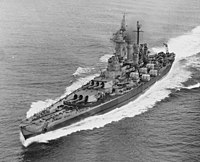The North Carolina class was a group of two fast battleships, North Carolina and Washington, built for the United States Navy in the late 1930s and early 1940s. The navy was originally uncertain whether the ships should be fast enough to counter the Japanese Kongō class, which was believed by the United States to be capable of 26 knots (30 mph; 48 km/h), or should sacrifice speed for additional firepower and armor. The Second London Naval Treaty's requirement that all capital ships have a standard displacement of under 35,000 long tons (35,560 metric tons (t)) meant that the desired objectives could not be fully realized within the treaty limits, and the navy considered over fifty designs before one was chosen.
Both North Carolina and Washington saw extensive service during World War II in a variety of roles, primarily in the Pacific theater. North Carolina frequently acted as an escort for the fast carrier task forces, and also conducted shore bombardments. In 1942, during the naval battle of Guadalcanal, Washington heavily damaged the Japanese battleship Kirishima in a chaotic night engagement; Kirishima had to be scuttled the next day. She also served as a carrier escort. In February 1943, she collided with the battleship Indiana and suffered severe damage to her bow. Following repairs, Washington rejoined her sister for the Battle of the Philippine Sea. After the end of the war, both ships took part in Operation Magic Carpet, the withdrawal of American military personnel from overseas deployments. The vessels were laid up in the reserve fleet until the early 1960s, when North Carolina was sold to her home state as a museum ship, and Washington was broken up for scrap.
